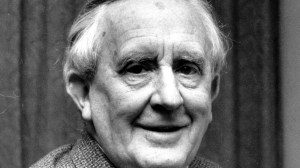In this series
Tolkien and his Christian literary peers wrote for people who did not know the faith, or did not like it, or did not think it important—"a public which knows no History, no Classics, no Theology, and has almost forgotten its Bible," Dorothy L. Sayers complained.
"At its best our age is an age of searchers and discoverers, and at its worst, an age that has domesticated despair and learned to live with it happily," said Flannery O'Connor.
T. S. Eliot described the writers (and readers) of the day as "those who have never heard the Christian Faith spoken of as anything but an anachronism."
This was the reader to whom writers like Tolkien, Sayers, Eliot, O'Connor, Evelyn Waugh, and Graham Greene wrote. Yet Tolkien's books were less obviously Christian than theirs. He did see his Lord of the Rings as a "fundamentally religious and Catholic work." He even expressed some frustration that readers did not see this. But in writing Christian truth to a swiftly secularizing modern world, Tolkien took a different tack.
Where's the faith?
First, he only wrote stories. He wrote nothing directly Christian or apologetic. C. S. Lewis wrote apologetics, literary criticism, theological studies, allegories like The Great Divorce, and whatever The Screwtape Letters is. Williams wrote apologetics, biographies, histories, and theology. Sayers wrote apologetic essays like "Creed or Chaos?" and theological works like The Mind of the Maker. Waugh, Eliot, O'Connor, and Walker Percy all wrote essays on the faith and reviewed religious books for secular magazines.
These writers used their literary gifts to present the old arguments in a new way. Tolkien did not do this at all. Besides his stories, he wrote a few academic papers on early English literature and just one essay, "On Fairy-Stories," giving his own religious ideas in any explicit form.
Second, he did not give his stories an overt religious meaning. Almost all his peers wrote stories whose Christian meaning was fairly obvious. In Lewis's Narnia Chronicles, Aslan, an obvious Christ-figure, tells the children that they were brought from earth to Narnia so "that by knowing me here for a little, you may know me better there." At the end of Sayers's play The Zeal of Thy House, the archangel Michael argues theology with the main character. Eliot wrote poems with titles like "Ash Wednesday" and reflected on prayer in his poetry and his plays. In O'Connor's Wise Blood, a young man tries to establish the "Church of Christ without Christ" and The Violent Bear It Away is the story of a boy called to be a prophet.
Stories, plain and simple
Tolkien did not do this at all. Even his story "Leaf by Niggle," which takes the painter Niggle from life through Purgatory to Heaven, does so without making it obvious in any way. Tolkien wrote the story he felt he had been given to write, and wrote it for those who cared to read him (he didn't expect many would).
He had a reason. Whereas his friend Lewis thought that "the author as author" should only write what "the author as man, citizen, or Christian" approved, Tolkien thought that writing stories was good in itself. Writing them was the job God had given him.
The stories were stories, he insisted over and over. They were not disguised sermons, or even stories with sermons hidden inside them. The Lord of the Rings "is not 'about' anything but itself," he wrote his American publisher. It "was written to amuse (in the highest sense): to be readable. There is no 'allegory,' moral, political, or contemporary in the work at all," he told a reviewer. Elsewhere he wrote, "I neither preach nor teach."
So what was Tolkien trying to do in The Lord of the Rings? How could such a book say anything about Christianity to readers who did not know the faith, did not like it, or did not think it important?
Different world, same order
It is a Christian story because it reveals the world Christians know exists, but others do not. Even with creatures like hobbits and ents and orcs, the world of The Lord of the Rings shares the same moral and spiritual order as ours, the order Christians know through revelation.
A good story is a "sub-creation," as Tolkien called it, which has truly and accurately to reflect the creation. Writers put the moral and spiritual rules of the "primary world," the world God created, into the "secondary world" they create.
One of his objects in writing, he said, was "the elucidation of truth, and the encouragement of good morals in this real world, by the ancient device of exemplifying them in unfamiliar embodiments, that may tend to 'bring them home.'"
This Tolkien did in The Lord of the Rings. He wrote a story that reflected the world that Christians knew existed without giving obvious hints. Take his treatment of Providence, for example.
God is not mentioned at all in the book. All that the characters and the readers know is that some power, unnamed and unknown, is guiding events, but they do not know if the story will end well or badly.
In The Hobbit, Bilbo had spared the life of the miserable, treacherous creature Gollum even when Gollum threatened his. Near the beginning of The Lord of the Rings, the frightened Frodo says that it is a pity Bilbo did not kill him. Gandalf exclaims, "It was pity that stayed his hand. Pity, and Mercy: not to strike without need" and explains at some length how these are to work.
Throughout the story, several characters show Gollum mercy and pity, even when they could have felt justified in killing him. In the end, of course, Gollum does what only Gollum could have done, and in spite of himself destroys the Ring and saves the world.
That ending gave the story what Tolkien called "eucatastrophe," the "consolation of the happy ending" that the reader does not expect. This, he said, "denies (in the face of much evidence, if you will) universal final defeat and in so far is evangelium, giving a fleeting glimpse of Joy, Joy beyond the walls of the world."
That is a simple outline of a complex and subtle story. In the unfamiliar secondary world of Middle-earth, Tolkien showed how Providence works out its ends in the primary world we live in.
Tolkien and his peers wrote for people who did not know the Christian faith and did not much care to know it. They had to find ways to make people hear a story they did not want to hear.
Divine variety
Tolkien wrote a story that put the Christian story in "unfamiliar embodiments"—in the hobbits and elves and men and nazgul of Middle-earth. What did his peers do? Almost everything else.
Most did not try to create another world. The writer, O'Connor said, "is entirely free to observe. He feels no call to take on the duties of God or to create a new universe. He feels perfectly free to look at the one we already have and to show exactly what he sees."
O'Connor herself tried to shock her readers by making the conflict between God and the world so clear and even upsetting that they saw the Christian story afresh. In her most famous story, "A Good Man is Hard to Find," a serial killer called the Misfit talks with a grandmother about God while his gang takes her family into the woods and kills them.
Others tried to retrieve the older Christian forms or texts in the hope they might win a hearing by being so unusual. Both Williams and Sayers wrote modern versions of medieval mystery plays, and Sayers went on (under Williams's influence) to translate Dante's Divine Comedy.
A brazen grace
Sayers also tried to re-present the gospel story in modern form in her long play The Man Born to Be King, first performed on the BBC. Among other innovations, she had the apostles speak in working class accents to make listeners remember that they were normal working men. (And some listeners were scandalized, too.)
Some of the writers tried to weaken the world's appeal by making fun of the worldly alternatives. In The Loved One, set mostly in a Los Angeles mortuary, Waugh satirized a secular world that could deal with death only by dressing it up. In Lost in the Cosmos, Percy proved that moderns are indeed lost through the methods of therapeutic manuals and television shows.
The more traditional novelists among Tolkien's peers wrote stories that let the reader know the secret, that showed grace at work in a recognizable situations and people. In Greene's The End of the Affair, a man thinks his mistress had left him for another man, only to learn that she had left him for God. In his The Power and the Glory, an alcoholic priest perseveres in serving God and is used by him despite all his sins.
In Waugh's Brideshead Revisited, the narrator has ruined his life and yet finds at the very end of the book that the Lord is truly with him. In the book, he tells the story of God working upon a family with "the unseen hook and invisible line" and moving them to him with "the twitch upon the thread."
Entertaining mercy unawares
In contrast, Tolkien did none of these. He gave the reader no obvious signs that his story was a Christian story. His was a more radical and riskier work.
The reader knows from their stories that Lewis and Williams and Sayers and the rest were all Christians, without reading a word about them. Many readers do not know that Tolkien was a Christian.
But it may well be that Tolkien's The Lord of the Rings has taught the most people to see the world in a Christian way, even when they did not know they were being taught. They learned the Story through a story that seemed to have nothing to do with God at all. Tolkien propagated the faith among people who had bloodhound-keen noses for propaganda.
Most modern people think as Frodo did when he first learns about the Ring and wishes his uncle had killed the vicious Gollum. They do not believe in mercy. But those who, through reading The Lord of the Rings, come to see how mercy might work for good, will find it easier to love Mercy when they meet him.
David Mills is a senior editor of Touchstone magazine.
Copyright © 2003 by the author or Christianity Today/Christian History magazine. Click here for reprint information on Christian History.














